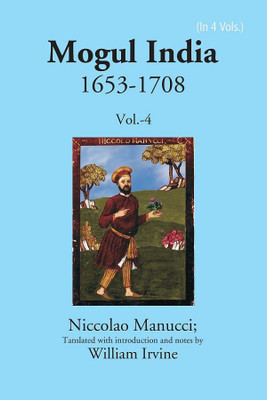Mogul India 1653-1708(Paperback, Niccolao Manucci, Tanslated with introduction, notes by William Irvine)
Quick Overview
Product Price Comparison
About The Book ŌĆō Those are kings whom God appoints, but as they know not His secret purposes, men decline to acknowledge those who unjustly seize some kingdom. God alone raises men to the throne to be either a scourge or a solace to their subjects. Thus, although the holy men of Mecca declined to accept the gifts sent by Aurangzeb, because Shahjahan, his father, was still alive. I shall not, in this my book. Delay speaking of him as king until the death of Shahjahan, but from the commencement feel obliged to concede his being such, for as an undisputed monarch he ruled over Hindustan ; Finding himself now arrived at the goal of all his hopes, his father in prison, his brothers dead, Aurangzeb ordained a nine days' festival, during which he received congratulations and valuable gifts from the great men of the kingdom. He continued his accustomed sacrifice of pimento, which he began when prince in the Dakhin. This was conducted in the following way: Madras: what happened there while the Patriarch of Autioch was at Pondicherry, Dispute over the Confraternity of the Rosary, Returns to doings of Aurangzeb, Aggressive acts of new Portuguese Chief Captain at San Thome, Dispute between the Bishop and the French Capuchins as to the custody of Madras churches, Just and unjust judges, Story of the Sebastiani Chief Captain of San Thome, Aurangzeb and the Mahrattahs, Christian quarrels at Madras, AurangzebŌĆÖs campaigns, Poll-tax on Hindus, Letter from Secretary to Venetian Senate, Tanjor Christians and the Jesuits, Kandy: intelligent conduct of an elephant, Amanat Khan, Note on B. Phoosen and the capture of the Goude Vogel Phenix, The Dutch CommissaryŌĆÖs boasting humbled, Marriage of F. MartinŌĆÖs granddaughter, Portuguese misrule in San Thome, Arab Plundering near Daman, Armenians at Madras, Dispute at Madras about bequest of Friar Domingos, an Armenian Dominican, Death of Jani Begam, The French diamond merchant, Anecdote of ManucciŌĆÖs youth at Dihli, Indians and spirit drinking, JesuitsŌĆÖ plays acted in Pondicherry, The Dutch obtain of grant of Conimere, Jesuits: their spying and interfering ways. Mahrattahs near Surat, Surat: Mahomedan merchants complain against the Portuguese, Bengal: Monsieur Bouynot appointed to the prize ship, the Phenix, Present Kings, AurangzebŌĆÖs plans, Surat, Dutch ships at, March, AŌĆÖzam Shah rejoins AurangzebŌĆÖs camp, Shah ŌĆśAbbas, The Armenian Dominicans, Thomas and Minas, Da,ud Khan and is dogs, Persian physicians jealous of Europeans, Prince AkbarŌĆÖs death, Qandahar and Gurgin Khan, Geogian, Aurangzeb unable to leave Dakhin, ManucciŌĆÖs wife dies, Persecution of Capuchins. About The Author -: Niccolao Manucci (1638ŌĆō1717) was an Venetian writer, doctor and traveller, who wrote a first hand account of the Mughal Empire. In 1653, he was recruited as a servant and guide by Henry Bard, 1st Viscount Bellomont, envoy from Charles II of England to Abbas II of Persia and Shah Jahan. After Bard died at Hodal on 20 June 1656, Manucci remained in India for the rest of his life and is one of the few first hand European sources for Shah Jahan, Aurangzeb, Shivaji, Dara Shikoh, Shah Alam I, Jai Singh I and Kirat Singh. Manucci is famous for his work "Storia do Mogor", an account of Mughal history and life. Manucci had first-hand knowledge of the Mughal court, and the book is considered to be the most detailed account of the Mughal court. It is an important account of the time of the later reign of Shah Jahan and of the reign of Aurangzeb.He wrote about his work: "I must add, that I have not relied on the knowledge of others; and I have spoken nothing which I have not seen or undergone..." .Manucci spent almost his entire life in India. He would then send home the manuscript for "Storia do Mogor" which was lent to the French historian Fran├¦ois Catrou in 1707. Catrou wrote another version as Histoire g├®n├®rale de lŌĆÖempire du Mogul in 1715. The original then emerged in Berlin in 1915 and was written in three different languages. This version was translated and then published. About the Translator:-William Irvine (1840 ŌĆō 1911) was an administrator of the Indian Civil Service and historian, known for works on the Moghul Empire. He was in British India from 1863 to 1889. Leaving a private school before he was 15, he served a short apprenticeship to business, and after spending some years as a clerk in the admiralty passed for the Indian Civil Service. He landed in Calcutta late in 1863, and was posted to the North-Western Provinces. He served there as a Magistrate and Collector until he retired and left India in 1889. He was employed for eight years in revising the rent and revenue settlement records of the Ghazipur district. The Title 'Mogul India 1653-1708 written/authored/edited by Niccolao Manucci; Tanslated with introduction and notes by William Irvine', published in the year 2021. The ISBN 9788121299268 is assigned to the Paperback version of this title. This book has total of pp. 655 (Pages). The publisher of this title is Gyan Publishing House. This Book is in English. The subject of this book is History. Size of the book is 13.34 x 21.59 cms Vol:- 4th


